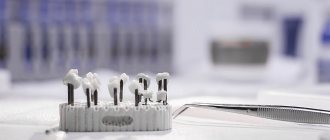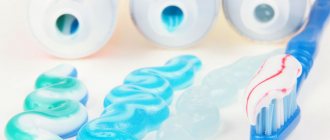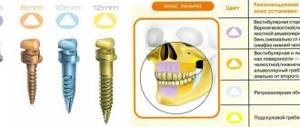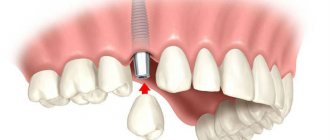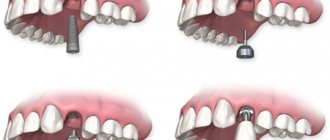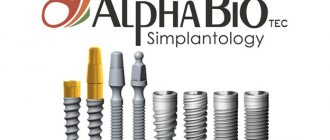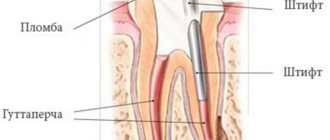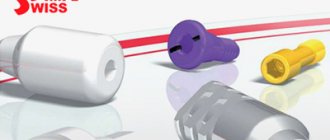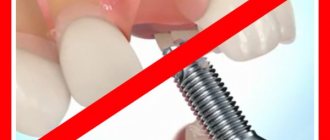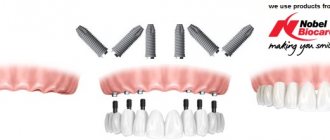Any patient is interested in the question - which dental implants are the best? Which dental implants provide high quality at an affordable price? Which implants are best to avoid and try not to mess with? We will try to answer all these questions below.
Dental implants are divided by country of manufacture and by manufacturer within their countries. Since, first of all, manufacturers compete and focus on competitors within the country, therefore, implants from different companies in the same country have approximately the same level of quality and cost.
Before you start reading this article, you should understand that our rating includes manufacturers of implants that have already proven themselves in the market. The realities of the modern medical market are such that only those manufacturers that provide a good price/quality ratio survive in the market.
Best Dental Implants by Country
The best ones are those that suit a specific clinical case. But if we take into account world statistics based on the choice of doctors, we get the following list:
- USA
- 50-60% of the market is occupied by Nobel Biocare and Straumann. Another 30% is shared by Zimmer and a number of other manufacturers. 10% is divided among small companies. - Europe
- here the first three places are occupied by: Straumann, Nobel and Astra Dentsply Sirona (60% of the market). Approximately 5-7% remains with Zimmer, and the remaining share belongs to local manufacturers, for example, German ones, which produce the popular Ankylos and Xive lines. - Russia
- premium segment models (from the USA and Switzerland) are in demand; from the middle segment of implants, Osstem (South Korea) and Mis (Israel) can be distinguished as the most popular in Russia.
Does the chosen implantation method affect the quality of implant healing?
Today, doctors offer patients to solve dental problems with different implantation methods. This can be a classic treatment option, when a two-stage approach is practiced - after installing the implants, some time must pass (4-8 months) for their complete engraftment, and only after that can the installation of prostheses begin. Naturally, during this time the patient will not have to remain without teeth - it is possible to use lightweight removable dentures or metal-plastic crowns. Classical implantation places high demands on the patient’s jaw bone tissue - in case of atrophy, it is additionally necessary to carry out osteoplastic operations and wait for a rehabilitation period, which is about six months, because if it is deficient, carrying out the procedure is risky and is fraught with rapid rejection of the structures.
If your choice fell on a one-stage implantation option, then the load on the implant is carried out immediately, i.e. you don't have to wait six months to get the smile of your dreams. Moreover, installed implants will take root faster if the chewing load is transferred through them to the bone - it is saturated with oxygen and its cells actively multiply, which means the implant will take place very quickly. This process takes place in a more natural way: you can eat immediately after implantation, and the jaw bone tissue fuses with the body of the implant at this time.
Both methods have the right to life. And if the doctor is a professional, if he has chosen the right treatment protocol, then dental implantation will be carried out with high quality, regardless of what method was used.
What is the rating based on?
Let's highlight the 6 most weighty criteria:
- Price
. On average, the price tag of premium implants is almost 2 times higher than that of business and economy class models. However, thanks to growing competition, the trend is gradually changing, and market leaders are gradually releasing inexpensive analogues, reducing the price of premium systems. - Survival rate
. Its percentage is calculated based on studies conducted by reputable organizations. The longer a brand is on the market, the more accurate the survival rate, as more patient observations were conducted. - Popularity
. Not only reviews from doctors, patients and reputable scientists are taken into account. The number of studies devoted to a given brand significantly influences this indicator. - Guarantee
. Only some manufacturers offer a lifetime warranty. The rest are limited to 5 – 25 years. - Range
. Considered: Does the company produce systems for one or more implantation protocols? Can its products be used for diabetes mellitus, pronounced bone tissue atrophy, or in another difficult clinical situation? - Market coverage
. Emphasis on manufacturers from the USA and Europe, since most countries (Russia included) focus on them.
What determines the success of osseointegration
Several factors influence the success of engraftment:
- Proper preparation and planning.
- Patient's health status.
- Use of high-quality implants.
- Selecting an implantation method that is appropriate for the clinical situation.
- Correct calculation of the prosthesis design.
- Compliance with recommendations after implantation.
Attentive attention to each point ensures engraftment without complications.
Risks at the diagnostic and preparation stage
In order for engraftment to proceed without problems, it is important to eliminate risks at the stage of preparation for implantation:
- An examination is carried out for general somatic diseases to identify contraindications to surgery.
- The doctor diagnoses diseases of the oral cavity that are in the acute stage, paying close attention to the future site of implantation and surrounding tissues. The oral cavity is sanitized, adjacent teeth are treated, and plaque and stone are removed.
- An implant treatment plan is drawn up, and recommendations are given to the patient on the rules of preparation for the operation.
- 3D computer modeling helps to choose the shape and size of the implant. This is necessary so that the design fits the patient’s bone characteristics and does not reject it.
Patient's health status
Successful implantation is impossible in case of serious diseases that can cause implant rejection. The main contraindications for which implantation is strictly prohibited:
- malignant tumors;
- decompensated diabetes mellitus;
- blood clotting disorder;
- mental illness;
- tuberculosis;
- pathological diseases of the cardiovascular system;
- risk of heart attack or cardiac arrest;
- disruption of the immune system;
- thyroid diseases.
The patient should not hide his condition and agree to the procedure without prior diagnosis. In addition, diagnostics will help identify hidden diseases that you may not be aware of. Therefore, before the procedure, the doctor collects anamnesis and prescribes tomography, blood tests, and ECG for patients at risk.
Rating of dental implants
Our rating includes the most common premium systems in Russia, as well as business and economy class brands.
Top manufacturers of premium implantation systems
Straumann implants
Swiss company Straumann Group. It is not only a world leader in the production of implants (market share - 24-29%), but also a leader in the development of innovative treatment concepts, thanks to which the engraftment time of an artificial titanium root is halved. The assortment includes expensive and more affordable products.
Nobel implants
Nobel Biocare (Headquarters in Switzerland, main production in the USA). This company accounts for almost 1/5 of the world market. Nobel is the developer of the popular All-on-4 implantation protocol, Zygoma zygomatic implants and other unique concepts. All Nobel Biocare product lines emphasize excellent aesthetics and an effective solution to any clinical situation.
Astra Tech implants
Dentsply Sirona is known for its premium line of Swedish Astra Tech implants (production launched in the USA, Sweden and Germany). The company also offers a wide range of business class titanium rods. The share on the world market reaches 15%.
Zimmer implants
Zimmer Biomet (7% market). The company is known for being the only one in the world that develops and produces trabecular implants made of tantalum (a material that provides the highest level of biocompatibility and survival rate). The production of high-quality implantation systems is concentrated in the USA and Switzerland.
The best business and economy class implants
Osstem implants
Artificial tooth roots from South Korea, where they occupy first place in sales volume (5th place in the world). Osstem Implant is one of the most widespread brands in Russia. The company owes its popularity to its flexible pricing policy and the best price-quality ratio.
High-quality lines of Tapered Plus, Tapered Pro and Tapered 3.0 pins from the American company Biohorizons, which has been successfully operating in the dental products market for 23 years (since 1997). “Biohorizont” is known in many countries, including Russia.
AnyOne and Anyridge implants
South Korean implants AnyOne and Anyridge (economy/business class), developed by Megagen Implants. The former are suitable for all treatment protocols. The latter are suitable for immediate implantation even with serious bone tissue defects.
Xive and Ankylos implants
Two lines of business-class artificial tooth roots: Xive and Ankylos. All systems have a high survival rate. They are produced by the German division of Dentsply Sirona. The quality of implantation systems of this brand is confirmed by retrospective studies and many years of successful practice in different countries.
MIS implants
Several lines of MIS implants with a lifetime warranty. They are produced from factories in Israel, France and Germany. Every year the company produces more than 1,500,000 products, while simultaneously engaged in a comprehensive study of problems in dentistry and conducting numerous studies. Their results can be found in international publications (for example, in JOMI or Implant Dentistry).
DIF implants
Low-cost DIF systems (Israel), which are successfully installed immediately after tooth extraction and are used even in complex clinical cases, for example, with a lack of bone tissue (without bone grafting). All products of the Israeli company comply with current international standards 9001 and 13845.
Model overview
Analog products from some Russian companies can be a good alternative to popular implants.
Having applied global experience in their work, domestic manufacturers produce no less high-quality, and most importantly, more affordable dental structures.
Conmet
The company's catalog is presented in three models:
- Classic. These are screw artificial roots with double thread. They are produced in two diameters – 4.8 mm and 4.0 mm. Lengths 8.0 mm, 10.0 mm and 12.0 mm.
They are equipped with a platform switching function, due to which the rod is inserted with minimal resorption of the jaw bone and maximum aesthetics.Double thread ensures uniform distribution of the chewing load, and high-tech surface treatment ensures accelerated osseointegration. The systems are recommended for use in two-stage classical surgery.
- Cylindrical. Having a cylindrical shape, they are produced in diameters of 5.5 mm and 3.5 mm with individual selection of lengths (from 8.0 mm to 16.0 mm).
Aggressive threads help securely secure the product in bones of different densities, so they are used when the height of the alveolar is insufficient (up to 10 mm) or when performing one-stage implantation. - Conical. Depending on the location of the dental unit being restored, the rods are produced with diameters of 4.5 mm or 3.4 mm.
They can be implanted into the socket of an extracted tooth, if it is close to the area of the maxillary sinuses and neurovascular bundles to be restored, or if the volume and quality of the jaw bone is insufficient.The tapered shape of the shaft combined with the aggressive threading provides sufficient initial stability and further stability.
In addition to the indicated indications for use, Conmet systems can be installed for any form of edentia, end or frontal defects of the dentition, the impossibility of removable prosthetics, or for fixing conditionally removable or bridge dentures on implants.
As features of dental structures from this manufacturer, it is worth highlighting the following:
- Only hypoallergenic high-quality materials are used for production. Artificial roots are made of purified titanium, their periosteal part is coated with aluminum oxide, and the intraosseous part is coated with titanium powder, which guarantees rapid integration of the product.
- It is possible to implant some models immediately after tooth extraction , due to which the level of bone loss is reduced significantly.
- High quality implantation is ensured by the use of high-tech equipment and new materials . In the process of creating dental systems, precision laser cutting of parts, plasma coating, anodized titanium, and finishing are used.
- Strengthening the neck of artificial roots ensures uniform distribution of the chewing load along the entire length of the product, which reduces the likelihood of its fracture.
- It is possible to make an implant from a gold alloy (at the patient’s request). But here you need to realize that gold, in comparison with titanium, has high ductility, which negatively affects the ability to withstand high loads.
Among the advantages provided by the use of Konmet models, the following points are indicated:
- A wide range allows you to choose an option that suits a specific clinical case.
- The use of three-dimensional prototyping technology during production, which makes it possible to manufacture individual implants, reduces the duration of osseointegration, increases the accuracy of fixation and reduces the traumatic nature of the process.
- Affordable price. The manufacturer's policy made it possible to set a price for products that is several times lower than foreign analogues.
- High aesthetics , thanks to which it is possible to restore even the frontal group of teeth.
- Versatility , which means the system can be implanted using various protocols.
Among the shortcomings, one can highlight such factors as isolated cases of rejection, which are mainly due to the actions of the patient himself, or the doctor’s violation of the installation protocol due to unprofessionalism.
The video provides additional information about Konmet implants.
Rusimplant
The catalog presented by the company contains several options for dental implants intended for use in a specific clinical case.
Leader
The models are suitable for solving various clinical problems. This became possible thanks to the use of special manufacturing techniques.
The design is distinguished by the presence of a dodecahedron, a self-sealing fit cone, and two types of self-tapping threads - large aggressive and small six-start.
The conical shape of the screw ensures atraumatic and, most importantly, rapid insertion into the bone.
Pros: sufficient primary stability, the ability to be implanted into weakened bone tissue, resistance to lateral loads, and the ability to compact bone mass.
Short
This is a shortened model with a wide diameter, which can be installed without prior bone grafting surgery.
Models are recommended if there are problems with the condition of bone tissue or reduced alveolar height. A product with a three-start self-tapping thread with an angled shoulder.
Rods can be implanted when there is insufficient bone volume , installation is quick, and osseointegration time is reduced.
Assets
The model is intended for use in cases of severely weakened jaw bone. Features: presence of a landing cone, hexagon, hollow design, apex with 2 through holes on the sides.
The neck has fine carvings, which gradually give way to large ones. The thread is equipped with a self-tapping function.
The shape of the artificial root is designed so that the bone is practically not damaged during its insertion , and the presence of a cavity and a pair of holes improve tissue nutrition under the surface of the structure.
Positive aspects are the rapid process of osseointegration, the absence of bone injury and support for its nutrition.
Lux
The rods are installed in bone of any density. Fine threads are applied to the upper part in increments of 0.25 mm, and large threads (0.75 mm) are applied to the lower part.
This thread geometry ensures painless insertion of the implant and obtains primary stability.
Pros: long service life, increased contact area, good stability.
Standard
Available with a semicircular apex and aggressive trapezoidal thread with a pitch of 0.8 mm. Advantages: no vertical shift of tissues under high loads, large contact area.
Today, Standard implants have been discontinued by the company.
Mini
They are used to place temporary prosthetic structures during long and complex restoration of dentition.
Also application cases are:
- immediate restoration of facial aesthetics;
- protection of soft tissues in the area where the permanent structure is implanted;
- insufficient alveolar height.
It is produced in two versions - with a cone-shaped head for securing a fixed prosthesis, and with a spherical head for removable structures.
Advantages: sufficient primary stability, simple installation.
Three popular models of Ards implants and indications for their use.
Come here to take a closer look at the design of 3i biomet implants.
At this address https://www.vash-dentist.ru/implantatsiya/proizvoditeli/roott.html read how the issue of installing Roott implants is resolved.
Small
Implants of this series have a small diameter and are intended only for the restoration of the upper (lower) incisors.
The systems show good stability in cases of bone deficiency and low alveoli, thanks to the presence of fine threads in the cervical region and larger threads on the body.
Fixation of the prostheses occurs due to the presence of an internal hex screw. It also minimizes the likelihood of the artificial root breaking due to overload. Pros: good primary stability, accelerated osseointegration, stability.
Features of systems from the Rusimplant company are the following characteristics:
- Material . All produced models are made of purified grade 4 titanium, characterized by ideal biocompatibility, bioinertness, increased strength, hypoallergenicity, and durability.
- Surface . The presence of the Smart surface allows for accelerated osseointegration.
- Geometry. Each version produced has a cylindrical hexagonal shape, but differs in thread, apex shape and abutment type.
- Versatility. Thanks to many modifications of artificial roots, doctors can restore teeth in any clinical cases.
- Sterility. Each structure is irradiated with gamma rays, which guarantees complete disinfection of their surfaces. Upon completion of processing, the implants are placed in a sealed package that maintains sterility. All packages are supplied with a quality certificate.
- Life time. The company guarantees a 15-year service life for all models. If you follow the recommendations for care and use, the actual service life increases to 25 years.
The undeniable advantages of the systems are:
- cost, which is half lower than foreign analogues;
- good survival rate;
- sufficient strength;
- ease of installation;
- the presence of a modern technological surface;
- compliance with all international quality criteria;
- practicality.
The main disadvantage is that they cannot provide the same aesthetic indicators in the frontal zone as their foreign counterparts.
Iris
The company produces four models for its potential patients:
- LIKO-M .
Classic model with atraumatic apical end and frequent thread stroke. Suitable for recreating large chewing elements. It has protection against self-twisting, high strength, and accelerated osseointegration. The design prevents the entry and proliferation of pathogenic bacteria under the prosthesis and provides an expanded area of contact with the bone body. - LIKO-M EVOLUTION. Intended for implantation in areas with low quality and sparse bone tissue during surgery with one-stage prosthetics.
The implants have a standard length, a rare but high thread, which ensures the best fixation in the bone and rapid integration. - LIKO-M SLIM. Non-standard model - has a diameter of only 3.0 mm.
Installation is recommended for poor-quality bone or its small volume and width. Also suitable for replacing lateral incisors in any jaw. Despite its small size, the product shows sufficient stability and strength. - LIKO-M MINI. It is a cone-shaped product with a rare thread pitch.
It is produced in two versions of the supragingival part - spherical and square. The systems are designed to secure any type of prosthesis. But more often they are used as a basis for a conditionally removable system.
Iris products gained popularity and demand thanks to:
- A shortened rehabilitation period, occurring in most cases without complications.
- Good biocompatibility, which is achieved by using titanium purified from additives.
- Satisfactory survival rate , achieved due to the presence of a rough microrelief on the surface and repeated etching of the material with acid.
- Reducing the occurrence of long-term complications to zero, thanks to the barely visible gap between the abutment and the intraosseous part.
- Quality . Despite the fact that the system in question is a Russian development, its production takes place in Italy. Each stage is controlled and carried out using Swiss and Italian equipment.
- Wide range of applications . The versatility of the models allows them to be used in different clinical cases, and at the same time achieve high quality indicators of the operation.
- Possibility of replacing individual components. With long-term use of the structure, the abutment can be replaced for further prosthetics.
Important! Relative disadvantage is overpriced. When analyzing prices for middle-class implants, the models considered cannot be called cheap.
Zimmer trabecular implants and their purpose.
In this publication you will find detailed information about CSM implants.
Here https://www.vash-dentist.ru/implantatsiya/proizvoditeli/superline-koreyskogo-kachestva.html all the most important things about Superline implants.
Table with ratings and prices of the reviewed brands/lines
| Brand/Line | Price, rub.) | Survival rate | Guarantee | Segment | Popularity |
| Straumann Group | 40 000 – 70 000 | 99,5% | Lifetime | Premium | 5 points |
| Nobel Biocare | 40 000 – 75 000 | 99,3% | Lifetime | Premium | 5 points |
| Astra | 40 000 – 70 000 | 99% | Lifetime | Premium | 4 points |
| Zimmer Biomet | 40 000 – 60 000 | 99% | Lifetime | Premium | 4 points |
| Osstem | 20 000 – 30 000 | 98,9% | Lifetime | Economy/Business | 5 points |
| Biohorizons | 40 000 – 60 000 | > 98% | Lifetime | Business | 3.5 points |
| AnyRidge/AnyOne | 20 000 – 40 000 | > 98% | Lifetime | Business | 3 points |
| Ankylos/Xive | 25 000 – 30 000 | > 98% | Lifetime | Business | 4 points |
| M.I.S. | 20 000 – 30 000 | > 98% | 5 years | Economy | 3 points |
| DIF | 18 000 – 20 000 | > 98% | 10 years | Economy | 3 points |
What should a patient do to ensure that the implants take root?
The International Implant Foundation cites insufficient oral hygiene as the first reason why a person may experience implant failure, both during the rehabilitation period and many years later. The following are the main recommendations that the patient must follow:
- You cannot load a newly installed implant: this rule is relevant for those patients who had their teeth restored using a classic two-stage protocol with delayed loading with a prosthesis. For those who have undergone one-stage treatment options, there are fewer restrictions - but you should also not, for example, try to chew whole hard fruits or meat in the first days, much less chew nuts,
- Do not overcool or overheat the body,
- you should not rinse your mouth or use a toothbrush for the first three days after surgery,
- do not smoke or drink alcohol,
- you cannot stop taking medications prescribed by your doctor,
- Do not hide the problems you have during the rehabilitation stage from your doctor.
The risk of rejection of structures increases in smokers. According to statistics, 30% of them already show signs of rejection in the first five years after implantation.
And vice versa, here is a list of what can and should be done after implantation:
- brush your teeth morning and evening: a waterpik will help with this (not earlier than after 2-3 weeks) and a brush with soft bristles (at least after 3 days). But it’s better not to use dental floss, because... it can injure the gums and lead to inflammation,
- rinse your mouth to remove food debris after snacking,
- in the first days after implantation, eat soft, pureed foods,
- drink through a straw for the first days,
- in the first days, exclude physical activity, flights, sports,
- stay calm: talk less, try not to yawn, sneeze, cough, or blow your nose, especially if bone augmentation has been performed,
- control your condition: increased body temperature, malaise, persistence of pain, swelling of soft tissues for longer than 5-7 days - a reason to consult a doctor,
- After passing the critical period, do not forget to visit the dentist: according to statistics, we can confidently speak about the complete engraftment of the implant in the jaw bone tissue approximately six months after its installation. All this time, the doctor is monitoring you quite carefully, but even after this time, do not forget about the need for preventive examinations and the importance of professional oral hygiene.
What to consider when choosing implants?
When choosing which dental implant to place, most patients primarily focus on cost. The price of budget systems is almost 2 times less than that of business and premium class products. This is true, however, it must be taken into account that the latter provide better osseointegration due to the use of an advanced alloy and type of coating (for example, grade 4 and SLA). In addition, economy-class implants are not used in all clinical cases (unlike “luxury” systems).
To determine which dental implant is best for your situation, you need to visit your dentist's office. Only after a thorough examination will the doctor be able to recommend several options for titanium rods from different price segments.
Why can't any brand guarantee 100% survival rate?
No matter how reliable a titanium rod is, it is installed in a living organism. Physiological processes occur in it, and it is influenced by external factors. Therefore, it is not possible to calculate absolutely all the nuances even if you use a high-tech product. But in general, 97-99% survival rate is an excellent indicator at this stage of development of dental medicine. In addition, whether an artificial root takes root or not often depends on whether the patient follows the doctor’s recommendations or not.
Question answer
Does smoking affect the healing of dental implants?
Yes, it does. Smokers are more likely to experience rejection in the medium to long term. Tobacco smoke reduces the activity of blood circulation, prevents the full supply of oxygen to tissues and the healing of wounds.
I am 62 years old. How long will the implant take to take root?
There are no strict age restrictions for implantation. But the survival period is determined by the condition of the bone tissue and the patient’s health. With age, osseointegration lasts longer, as bone tissue becomes more friable, immunity decreases, and systemic diseases appear.
The best method for restoring chewing teeth: prosthetics or implantation?
Patients who are missing several chewing units in a row often wonder what method of tooth restoration will be better: installing a dental bridge or implantation? The answer to this question will depend on how reliable and durable the result of the restoration a person wants to obtain. If quality, reliability, aesthetics and long service life of artificial teeth are important to you, you should definitely opt for implantation of chewing teeth. Implantation does not require grinding of healthy teeth - a procedure that weakens teeth and increases the risk of their rapid destruction.
However, if you do not yet have the financial ability to pay for the expensive service of implantation of chewing teeth, there is no point in postponing the restoration of chewing units. You can resort to traditional prosthetics and install a dental bridge supported by healthy teeth. A well-made prosthesis will help restore the aesthetic appearance of the dentition and all the functions of lost chewing teeth, and in addition, with systematic and competent care of the oral cavity and strict adherence to all doctor’s recommendations, it will have a fairly long useful life.
Installation of a dental bridge is a procedure that will be the best option for restoring chewing teeth if there are contraindications to implantation.
Calculate the cost of treatment by taking a short test in 20 seconds!
Do not delay your treatment, because in this matter time plays against us.
Alpha Bio
Alpha-Bio Tec is the oldest manufacturer, developing and producing implantation systems since 1998. The main advantage of pins of this brand is their universal toolkit for various types of implants, ensuring ease of use in dentistry.
The model range is represented by 6 lines of implants for various clinical cases, which are divided into 2 groups:
- With internal hex connection - models (NeO, SPI, ICE, DFI, ATID) - universal root pins for bone of various densities.
- With a conical hexagonal connection - models (NeO, NICE) - narrower titanium roots that are suitable for installation in conditions of limited space and insufficient thickness of the alveolar ridge.
Advantages:
- Large range of models, ease of use;
- Universal tools;
- Lifetime warranty on all models of titanium pins installed.
Limitations: Alpha Bio does not offer solutions for immediate loading and 1-day jaw implantation protocols (zygomatic and All-on-4).
